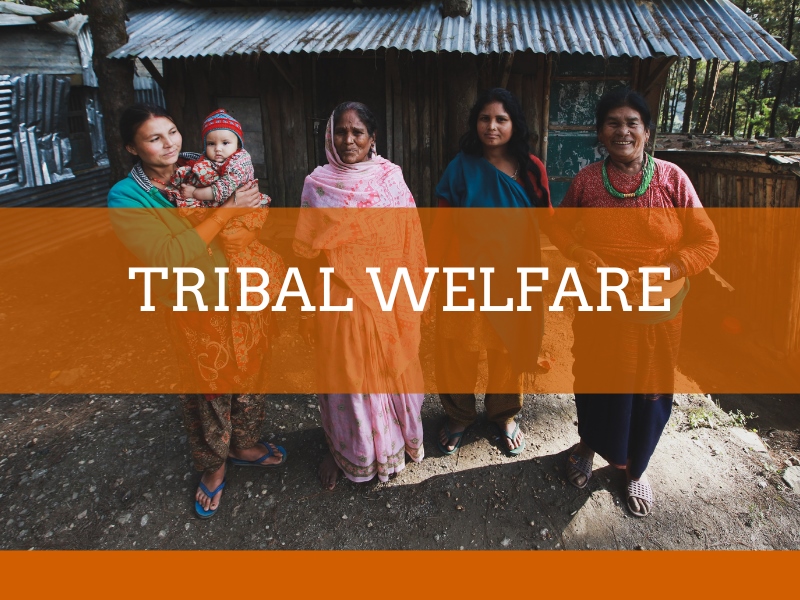Tribal communities are an integral part of a nation’s cultural fabric, enriching it with their unique traditions, knowledge, and way of life. Indigenous communities, with their deep-rooted knowledge of the land and their unique perspectives, offer invaluable insights into sustainable practices and resource management However, these communities often face marginalization and challenges that hinder their progress and well-being. Recognizing the significance of tribal welfare and sustainable development, societies and governments worldwide are increasingly focusing on creating inclusive strategies to uplift these communities. This article delves into the importance of tribal welfare and sustainable development, exploring the challenges they face, the initiatives being undertaken, and the transformative impact these efforts can have.
Understanding Tribal Welfare
Tribal communities, often residing in remote areas, face a range of socio-economic challenges. Lack of access to basic amenities, inadequate healthcare, education, and employment opportunities are common issues that contribute to their marginalization. These challenges are further exacerbated by cultural differences and historical injustices. As stewards of diverse ecosystems and repositories of traditional knowledge, tribal communities play a crucial role in maintaining ecological balance and cultural diversity.
Tribal welfare is crucial to ensuring that indigenous communities have access to basic amenities, education, healthcare, and economic opportunities. It involves providing them with the necessary tools and resources to thrive in a rapidly changing world while preserving their unique identities and ways of life.
By prioritizing tribal welfare, we acknowledge the importance of inclusivity and recognize that indigenous communities have a significant role to play in shaping a sustainable future.
Challenges Faced by Tribal Communities
Tribal communities grapple with a range of challenges, including limited access to quality healthcare, education, and livelihood opportunities. Land rights and displacement due to industrialization also threaten their way of life. Moreover, the preservation of their languages, cultural practices, and traditional knowledge are at risk due to globalization and modernization. These challenges demand a holistic approach that addresses both immediate needs and long-term sustainability.
The Essence of Sustainable Development
Sustainable development is a multidimensional approach that aims to meet the needs of the present without compromising the ability of future generations to meet their own needs. For tribal communities, sustainable development implies ensuring their economic, social, and environmental well-being in a manner that respects their cultural identity and preserves their natural surroundings. It involves empowering these communities to actively participate in decision-making processes that affect their lives and ensuring that development initiatives are culturally sensitive and environmentally responsible.
In the context of tribal welfare, sustainable development plays a crucial role in empowering indigenous communities. It involves implementing practices that promote economic growth while preserving the environment and respecting the rights and cultures of indigenous peoples.
Sustainable development provides an opportunity to harness the knowledge and wisdom of indigenous communities in finding innovative solutions to environmental challenges. By incorporating their traditional practices and respecting their rights to land and resources, we can create a more sustainable and inclusive future.
Initiatives for Tribal Welfare
Governments, non-governmental organizations, and grassroots movements are actively working towards improving tribal welfare and ensuring sustainable development. Initiatives include providing healthcare facilities, promoting education tailored to their cultural context, establishing vocational training centres, and creating opportunities for economic empowerment. Land rights advocacy and environmental conservation efforts also play a vital role in safeguarding their way of life.
The role of NGOs and grassroots organizations in supporting indigenous communities
Non-governmental organizations (NGOs) and grassroots organizations play a crucial role in supporting indigenous communities. These organizations often work directly with communities, providing them with resources, education, and advocacy.
NGOs can help indigenous communities access funding and technical expertise to implement sustainable development projects. They can also provide training and capacity-building programs that empower community members to take leadership roles in their own development.
Grassroots organizations, on the other hand, work at the local level, mobilizing communities and advocating for their rights. They often collaborate with indigenous communities to address their specific needs and challenges, ensuring that their voices are heard and their rights are protected.
The role of NGOs and grassroots organizations is essential in bridging the gap between governments and indigenous communities. Their work complements government initiatives and ensures that the needs of indigenous communities are met in a holistic and inclusive manner.
The Role of Empowerment
Empowerment is a central theme in tribal welfare and sustainable development. Empowering tribal communities involves not only providing resources and opportunities but also fostering a sense of ownership and agency. Participatory approaches that involve communities in decision-making processes ensure that development initiatives align with their needs and values. Empowered communities are more likely to actively engage in preserving their cultural heritage and adopting sustainable practices.
The Impact on Society
The well-being of tribal communities is intrinsically linked to the overall progress of society. Their sustainable development contributes to preserving cultural diversity, protecting ecosystems, and promoting social cohesion. When tribal communities thrive, the entire nation benefits from their valuable contributions to various sectors, including agriculture, healthcare, and arts and crafts. Their unique perspectives and knowledge systems enrich the collective wisdom of the nation.
Fostering Collaboration
Effective tribal welfare and sustainable development require collaboration among various stakeholders, including government agencies, non-profit organizations, academia, and the private sector. It’s essential to ensure that policies and initiatives are well-coordinated and aligned with the needs and aspirations of tribal communities. By working together, we can overcome challenges and achieve meaningful progress.
Ways individuals can contribute to empowering Indigenous communities
As individuals, we can also contribute to empowering indigenous communities and promoting tribal welfare. Each Person can make a change. How? Let’s check:
1. Educate ourselves: Take the time to learn about the history, culture, and challenges faced by indigenous communities. This will help us develop a better understanding and empathy towards their struggles.
2. Support indigenous businesses: Look for opportunities to support indigenous-owned businesses and artisans. By purchasing their products and services, we can contribute to their economic empowerment.
3. Advocate for indigenous rights: Raise awareness about the rights and issues faced by indigenous communities. Use your voice to advocate for policies and practices that promote inclusivity, respect, and justice.
4. Engage in meaningful partnerships: If you work in a field related to sustainable development or community empowerment, seek opportunities to collaborate with indigenous communities. By engaging in meaningful partnerships, we can ensure that our efforts are inclusive and respectful of indigenous knowledge and traditions.
5. Volunteer and support indigenous-led initiatives: Look for volunteer opportunities or donate to organizations that work directly with indigenous communities. Your support can make a significant impact on their well-being and development.
By taking these small steps, we can contribute to the empowerment of indigenous communities and work towards a more inclusive and sustainable future for all.
Conclusion
Tribal welfare and sustainable development are integral components of building an inclusive and equitable society. Empowering tribal communities to lead self-determined lives while preserving their culture and environment is a testament to a nation’s commitment to social justice and intergenerational equity. By recognizing the importance of tribal welfare and sustainable development, we pave the way for a brighter future where diversity is celebrated, ecosystems are protected, and all communities can thrive in harmony.
In essence, tribal welfare and sustainable development aren’t isolated goals; they are interconnected threads in the fabric of a just and prosperous society. By weaving these threads together, we can create a tapestry of social progress that benefits all, leaving no one behind.

